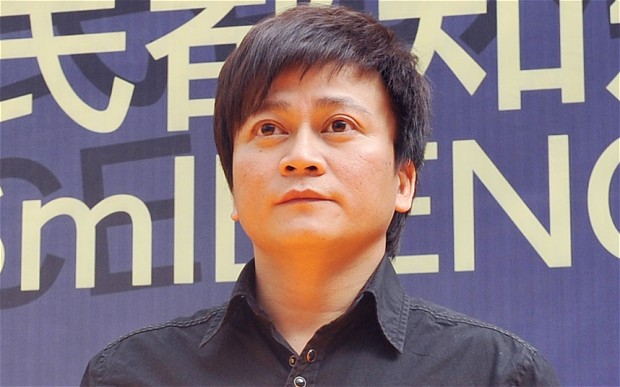Li Chengpeng's essay translated: watermelon vendor died pursuing the Chinese dream Translation of blogger Li Chengpeng's entire essay that has since seen him "gagged" by Chinese Communist party officials.  Li Chengpeng's essay has seen him 'gagged' by Chinese Communist party officials Photo: AFP
Li Chengpeng's essay has seen him 'gagged' by Chinese Communist party officials Photo: AFP
It takes four seasons for a watermelon to ripen and fall off its stem. It takes not even a few seconds to claim someone's life.
When the urban management officers ganged up to attack the watermelon vendor, perhaps it never occurred to them they were dealing with someone's life. In their eyes, human lives are not too different from watermelons.
Pick one from the vine, and one can walk away with it. It was no wonder that they said things such as "We might as well beat him to death."
In my dear motherland, every brand-new street has seen the brutality of urban management officers. How dare you say you have lived in cities, if you had not witnessed such incidents? Over time, we have become desensitised. But if you insist on looking for an ironic twist, look no further than the dead body of the watermelon vendor. Above it, a sign reads "A Model Street for Urban Management." It is a model to show to all of you.
Yes, of course the urban management officers did not beat the watermelon vendor. He just fell onto the ground himself and died. It was just like the "temporary rape", the "adjusted price hike", the "polite bribe", the "protective eviction", the "inflationary tightening" and "taking turns having sex". Yes, the officers did not kill the vendor. The watermelons did.
Our Constitution clearly says China "is a socialist state under the people's democratic dictatorship led by the working class and based on the alliance of workers and peasants". The workers lost their jobs. The peasants lost their land. They try to cope by planting watermelons, but they end up losing their lives.
When I say such things, some will probably accuse me of being unpatriotic.
But a friend reminded me of a scene in the movie Little Soldier Zhang Ga: Zhang Ga was selling watermelons, when a chubby Japanese translator wandered by. Zhang Ga did not run away, nor did the translator shoo him away.
Nor did he demand fees, or beat Zhang Ga to death and try to seize the corpse. He only ate Zhang Ga's watermelon by the street. As I look back now, Little Soldier Zhang Ga definitely seems a counterrevolutionary movie aiming to glorify our enemies.
Each time when I criticise urban management officers, some people will counter me by asking "Did the vendor not err by illegally occupying public space? Did the officers not get beaten as well?" That is our problem. Since we face such a lawless and ineffectual urban management system, shouldn't we pursue something more civilised?
The authorities dispatched hundreds of police, trying to seize the corpse of the vendor. This is in fact a metaphor for today's China, where the state is seizing property everywhere through a variety of means: businessmen are losing their enterprises and thrown into prison; an anonymous vendor is losing his watermelons. Sometimes it's the urban management officers that seize the property. Sometimes it's the court, or the bank, or the unpredictable policies.
To those business tycoons who have remained silent, please say something.
In this country, nobody is secure. If you choose to stay quiet today, they will be seizing your business empires tomorrow like they seized the watermelons.
To the government officials - give us fewer ostentatiously inspiring speeches, and more policies that will lead to a better living. Remind entrepreneurs of the boundary between normal business and theft; let employees know the standards of promotion, instead of the credit card number for bribery; show students the door to the recruiting office, not the bed of their bosses; give farmers the direction to their way home, not the passage to the underworld. Stop giving grand talks from your offices. If civilisation has only one sign in this world, it should be inside a fruit market.
A watermelon vendor named Deng Zhengjia "unexpectedly fell to the ground, and died". There are too many in this country who have "unexpectedly fallen to the ground and died". It could be a watermelon vendor. Could it be a country?
The watermelon vendor, Deng Zhengjia, lived in a mountain near Linwu County. He wanted to grow sweet watermelons, have a magnificent harvest, and sell his watermelons quickly, so that he could get home in time for dinner. This was his Chinese dream. He took great care of his watermelons.
Why didn't you take care of him? Before we sit down to talk about the Chinese dream, you should protect a watermelon vendor's dream.
Be nice to your people, and to your watermelons. Plant melons, you get melons. Sow beans, and you get beans.
Don't you understand? Running a country, after all, is not so different from planting melons.
Translation by Helen Gao
|
|
||
 |
| Touched | Sympathetic | Bored | Angry | Amused | Sad | Happy | No comment |
Rhythm Media Group is a multi-media company, operating a US-based Chinese daily newspaper, The China Press, and the paper's website - uschinapress.com (which has mobile-app version), as well as a Beijing-based English website Sino-US.com. The group boasts 15 branch offices across the US, and a number of cultural centers focusing on culture-related business in the North America, Chinese mainland, Hong Kong and Taiwan.Launched in September 2012, the Sino-US.com is designed to serve as a bridge between China and the US, and to keep its readership inside or outside China better informed by providing news and insights on China's current affairs, culture, life, business, people and sports.
|
|